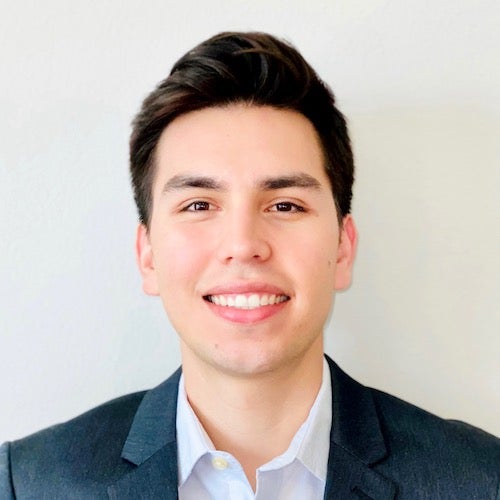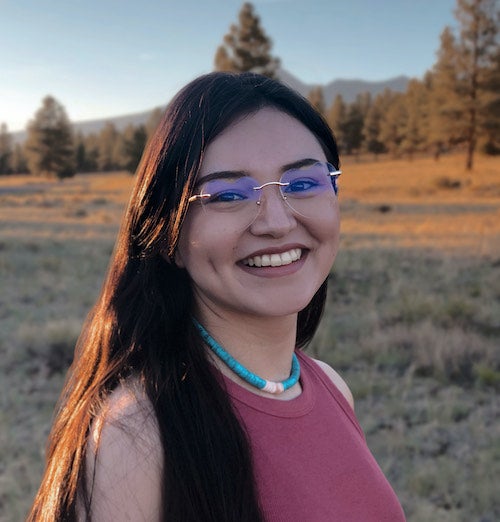Human Science Graduates Plan to Advance Health Equity Through Medical Education
July 6, 2021 – Later this summer, three recent human science graduates will be attending medical school with the hope of advancing health equity through their careers as physicians.
Jonathan Picos (NHS’19) will attend the University of California at Irvine School of Medicine, Jowan Watson (NHS’19) will begin at Harvard Medical School, and Yasmin Zuch (NHS’20) will start at the University of California at San Diego School of Medicine.

Reflecting the values of their education at Georgetown and the School of Nursing & Health Studies, Picos, Watson, and Zuch shared an inspiring vision for service.
Giving Back
Since graduating from Georgetown, Picos served, through Jesuit Volunteer Corps, for a year at Advocates for Children of New York, where he then worked full-time for another year on the staff.
“During my time as an education advocate at AFC, I supported at-risk immigrant students and students in the foster care system to achieve stronger educational outcomes,” he said.
Picos received a full scholarship for medical school and was admitted to the Program in Medical Education for the Latino Community (PRIME-LC), which he said is a combined medical degree and master’s program “focused on service to underserved Latino and Spanish-speaking communities.”
“I am looking forward to this incredible opportunity to give back to communities such as the ones I was raised in,” Picos said, noting his joint degree will enhance his knowledge base in education, health policy, and medicine. “The medical program I have chosen will allow me to gain skills in research, advocacy, and leadership to better serve Latino/Hispanic communities both in the US and abroad. I hope to practice medicine with cultural awareness and a focus on health equity and inclusion.”
Serving Underserved Communities

After completing his bachelor’s degree, Watson received a master’s degree in biomedical sciences at the University of Miami Miller School of Medicine.
Additionally, Watson has worked on depression-related research, served on the Alumni Advisory Board for Diversity and Inclusion at Gulliver Preparatory School in Miami, volunteered at church, and worked as a professional musician. He’s also creating a faith-health initiative “to promote health in underserved areas through the vehicle of churches.”
“The things I hope for out of medical school are that I become a competent physician, of course, but that I am culturally competent and humble so that I can better serve my patients no matter the social constructs that may describe their lives,” he said.
Watson hopes “to serve underserved communities like the ones in which I grew up,” helping “to de-characterize them as such.” He also looks forward to acting as a mentor to young people who share a “passion for medicine and service.”
Health Equity Focus
Since her 2020 graduation, Zuch has served as a public health associate at the National Indian Health Board through which she has had the opportunity to work on Tribal health projects. In addition, she has been a virtual scribe at an ob/gyn clinic in Oregon.
“Both have been thoroughly enjoyable and make me excited for my academic and professional journey,” she said.

Zuch will combine her medical degree with an MPH through the school’s Program in Medical Education – Health Equity (PRIME-HEq), which offers a scholarship for the year of master’s coursework. The program, she said, “is designed to expose and train medical students to better serve populations and communities at risk of health disparities.”
Zuch noted that “San Diego County has the most federally recognized Native American Tribes of any other county in the nation, so I’m looking forward to the opportunity to work more closely with Native populations in a health setting and prepare myself for my eventual employment with the Indian Health Service.”
Human Science Foundations
The Georgetown alumni said they appreciate the preparation they received in the human science major.
“I am grateful to human science for the mentorship and support I received in getting to this point,” Picos said. “My strong scientific background, exposure to research, and love for medicine were all nurtured through my interactions with the professors and peers I was lucky to meet.”
“Thanks to the human science program, I feel I will be able to hit the ground running once classes start in the next few weeks,” Zuch said. “I left Georgetown with a well-rounded understanding of human anatomy and physiology, and with all the care and guidance the human science faculty have shown me, I feel more than comfortable with asking research questions, reading peer-reviewed journal articles, and analyzing and communicating data.”
Watson, who recently published “Role Separation’s Impact on Student-Athlete Well-Being” in Journal for the Study of Sports and Athletes in Education, credited Professor Joan Riley with her mentorship during his honors thesis. (Visit the journal article.)
“The department helped to develop me into the scholar I am today,” he said. “At Georgetown, I played on the football team and suffered a serious injury. Through my rehabilitation, I developed a deeper appreciation for the multi-faceted concept of healing, and through the human science major, I was able to explore what that truly meant.”
By Bill Cessato
- Tagged
- health equity
